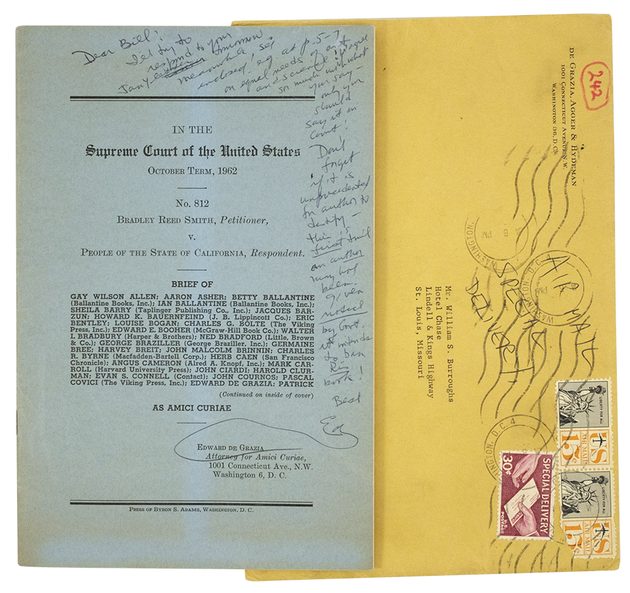
(BURROUGHS, William S.) DE GRAZIA, Edward
Attorney-Client Communication on the Censorship of Naked Lunch
1965. Attorney Edward De Grazia writes to Burroughs in January, 1965, the month of the Boston court case in which Grove Press appealed the Massachusetts ban on Burroughs' Naked Lunch. De Grazia writes across the cover of a 1962 amici brief, which he had filed on behalf of approximately 125 authors and publishers in the Supreme Court case involving a California bookseller who had been convicted for selling Henry Miller's Tropic of Cancer. De Grazia refers Burroughs to several pages in the brief "on equal needs of art and science," and then adds: "I agree with so much of what you say -- only you should say it in court! Don't forget if it is unprecedented for [an] author to testify - this is first time an author may have been given notice by Govt. it intends to ban his book!" Signed, Best/ Ed (who then circled his full name on the brief). Burroughs did not end up taking the stand, but De Grazia did call Norman Mailer, Allen Ginsberg and many others to testify as to the book's artistic merits: still, the book remained banned as hardcore pornography without redeeming social importance. The case was eventually won on appeal. [Meanwhile, the 1962 Tropic of Cancer case, involving bookseller Bradley Reed Smith, later better known as a fervent supporter of free speech surrounding the denial of the Holocaust, was remanded to the Appellate Department of the Superior Court for Los Angeles County; in 1964, De Grazia won a decision by the U.S. Supreme Court that overturned lower court rulings that Miller's book was obscene.] 13 page pamphlet; modestly sunned; near fine in stapled wrappers. Together with the mailing envelope from De Grazia, addressed to William Burroughs in St. Louis, Missouri. The Massachusetts Naked Lunch case remains, as of this date, the last major obscenity trial in American literature.
[#036503]
SOLD
All books are first printings of first editions or first American editions unless otherwise noted.